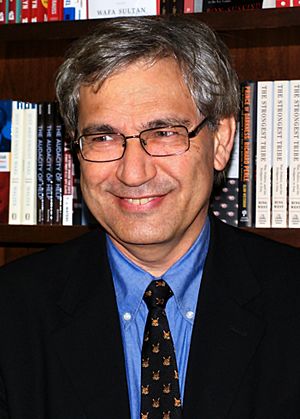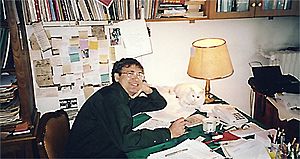Orhan Pamuk facts for kids
Quick facts for kids
Orhan Pamuk
|
|
|---|---|

Pamuk in 2009
|
|
| Born | Ferit Orhan Pamuk 7 June 1952 Istanbul, Turkey |
| Alma mater | |
| Spouse |
Aylin Türegün
(m. 1982; div. 2002)Aslı Akyavaş
(m. 2022) |
| Children | 1 |
| Signature | |
 |
|
Ferit Orhan Pamuk (born June 7, 1952) is a famous Turkish author. He has written novels, screenplays for movies, and taught at universities. In 2006, he won the 2006 Nobel Prize in Literature, one of the most important awards a writer can receive.
Pamuk is one of Turkey's most well-known novelists. His books have sold over 13 million copies and have been translated into 63 languages. This makes him the best-selling writer from his country.
Some of his most famous books include Silent House, The White Castle, The Black Book, My Name Is Red, and Snow. He teaches writing and comparative literature at Columbia University in the United States.
Born in Istanbul, Pamuk is the first person from Turkey to win the Nobel Prize in Literature. He has also won many other awards for his writing. His book My Name Is Red won three major international awards in 2002 and 2003.
Pamuk believes in the importance of being able to speak and write freely. He has written about difficult topics from Turkey's history, which sometimes caused problems for him in his home country.
Contents
Early Life and Education
Orhan Pamuk was born in Istanbul, Turkey, in 1952. He grew up in a wealthy family. He talks about his childhood experiences in his books, especially in his memoir, Istanbul: Memories and the City.
He went to Robert College, a high school in Istanbul. At first, he wanted to be a painter and studied architecture at Istanbul Technical University. However, after three years, he decided he wanted to be a full-time writer. He switched his studies and graduated from the Institute of Journalism at the University of Istanbul in 1976.
For eight years, from age 22 to 30, Pamuk lived with his mother while he wrote his first novel and looked for someone to publish it.
A Career in Writing
Pamuk began writing seriously in 1974. His first novel, Cevdet Bey and His Sons, was published in 1982. It tells the story of a rich family in Istanbul over three generations. The book won an award in Turkey.
His early books won several prizes. His historical novel The White Castle (1985) made him famous outside of Turkey. After this book, he began to experiment with new writing styles.
His 1990 novel, The Black Book, was a huge success in Turkey. It was a very popular and talked-about book because of its rich and complex story. In 1992, he wrote the screenplay for a movie called Secret Face, which was based on this book.
Pamuk also became known for supporting the rights of the Kurdish people in Turkey. He and other writers wrote essays that were critical of how the government treated the Kurds.
My Name Is Red
Pamuk became even more famous around the world with his 1998 novel, My Name is Red. The book is a mystery and a love story set in 16th-century Istanbul. It takes place during the time of the Ottoman Sultan Murat III.
The story explores the tensions between Eastern and Western art and ideas. My Name Is Red was translated into 24 languages. In 2003, it won the International Dublin Literary Award, which comes with a large cash prize.
When asked how the prize money changed his life, Pamuk said that nothing really changed because he is always working. He said he has spent 30 years writing, and for him, the work is what matters most.
Snow
In 2002, Pamuk published his novel Kar, which was translated into English as Snow. The story is set in the city of Kars, near Turkey's border. It explores the clash between modern, Western ideas and more traditional, Islamic ideas in modern Turkey.
The main character is a poet named Ka who gets caught up in conflicts between different groups in the snowy city. The New York Times named Snow one of its Ten Best Books of 2004.
Pamuk has said that he believes the art of the novel is about understanding people who are different from us. It requires imagination and a desire to see the world from another person's point of view.
The Museum of Innocence
After winning the Nobel Prize, Pamuk published the novel The Museum of Innocence in 2008. The book is a love story set in Istanbul.
Pamuk did something very unusual for this book. He created a real museum in Istanbul called The Museum of Innocence. The museum is filled with everyday objects that are connected to the story in the novel. Each object helps tell the story of the characters' lives.
He also worked on a documentary film called "The Innocence of Memories" that explores the museum and the novel's themes.
Speaking Out for Freedom
In 2005, Pamuk gave an interview to a Swiss magazine. He made comments about difficult events in Turkish history. Because of these comments, a legal case was started against him in Turkey for "insulting Turkishness."
Many famous writers from around the world, including Gabriel García Márquez and Günter Grass, spoke out to support Pamuk. They said the case was a violation of his right to free speech. The European Union, which Turkey wanted to join, also watched the case closely.
Pamuk said he made the comments to bring attention to the issue of freedom of speech in Turkey. He believed it was important for people to be able to talk about the past openly.
The charges against him were eventually dropped in 2006. However, in 2011, a different court ordered him to pay money to the people who had sued him.
Personal Life
Pamuk has an older brother, Şevket Pamuk, who is a professor of economic history. He also has a younger half-sister, Hümeyra Pamuk, who is a journalist.
In 1982, Pamuk married a historian named Aylin Türegün. They lived in New York City from 1985 to 1988 while she attended Columbia University. During this time, Pamuk was a visiting scholar and wrote his novel The Black Book.
He and his wife had a daughter, Rüya, in 1991. Her name means "dream" in Turkish. They divorced in 2002.
Pamuk has continued to teach at Columbia University. In 2022, he married Aslı Akyavaş.
Major Awards
Orhan Pamuk has received many awards and honors for his work. Here are some of the most important ones:
- 1990 Independent Foreign Fiction Prize (United Kingdom)
- 2003 International Dublin Literary Award (Ireland)
- 2005 Peace Prize of the German Book Trade (Germany)
- 2006 Nobel Prize in Literature (Sweden)
- 2010 Norman Mailer Prize for Lifetime Achievement (USA)
- 2012 Sonning Prize (Denmark)
He has also received many honorary doctorates from universities all over the world, including the Free University of Berlin, Yale University, and the University of Crete.
See also
 In Spanish: Orhan Pamuk para niños
In Spanish: Orhan Pamuk para niños
 | Laphonza Butler |
 | Daisy Bates |
 | Elizabeth Piper Ensley |


